Christchurch Travel Guide
Christchurch is the most English of New Zealand's cities. Named after an Oxford college, the atmosphere is reminiscent of an English university town, with school boys in striped blazers and punting on the River Avon, a grand Anglican cathedral dominating the central square, little stone-walled bridges, elegant Victorian architecture, and numerous parks and exquisite gardens.
Dubbed the 'Garden City', it's the lively capital of the Canterbury region, priding itself on its green areas, arts and history, as well as its sports. The surrounds offer beach suburbs, protected bays and dolphin swimming, green valleys and snow-capped mountain ranges for skiing, hiking, mountain biking, and climbing. The city itself has a relaxed and cosmopolitan centre with historic trams rattling along the streets of the bustling downtown area, a lively pub and restaurant scene, theatres, street buskers, museums, and art galleries.
Christchurch was devastated by a major earthquake in February 2011, and some of the damage is still evident, but the city has rapidly risen from the rubble and now frequently graces lists of the top cities to visit in the world. The nightlife and restaurant scene has bounced back impressively, with close to 1,000 cafes, bars, and restaurants currently operating in the city.
Christchurch is the gateway to the South Island and offers the visitor an appealing mixture of historic charm and vibrant city life, a pleasing balance between urban pursuits and outdoor activities. With the least rainfall of any of New Zealand's cities and plenty of sunshine, it's a perfect base for a diverse range of activities, including a Canterbury skiing experience.
Things to do in Christchurch
Christchurch is ideally situated for outdoorsy holidays, with countless beautiful scenic areas on the city's doorstep. The best adventure activities on a Christchurch holiday include kayaking, deep sea fishing, whitewater rafting, hiking, mountain biking, quad biking, 4x4 trails, skydiving, paragliding, hot air ballooning, and much more.
Mount Cook National Park, Akaroa, Lake Pukaki, and the Banks Peninsula are all popular areas to explore. Those wanting to meet the local wildlife and some exotic beasts from further afield should visit the Orana Wildlife Park or the Willowbank Wildlife Reserve.
There are also some worthwhile cultural attractions in and around Christchurch: the Canterbury Museum gives good background on the history of the city and the region, while the Ko Täne Living Maori Village in Willowbank Wildlife Reserve offers an exciting insight into the traditions of the indigenous Maori people.
Art fanatics will be impressed by Timaru's Aigantighe Art Gallery, and the Little River Gallery at the gateway to the Banks Peninsula. The Court Theatre entertains visitors with a fabulous schedule of shows; and because sport is integral to Christchurch culture, watching a rugby game at the famous Christchurch Stadium is a must.
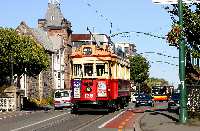
Christchurch Tramway
Christchurch's heritage trams, dating back to 1954, have been beautifully restored, offering visitors a unique experience that takes them on a two-mile (3km) loop of many of the city's best attractions. The drivers offer insight on the history, architecture, activities, and points of interest. Visitors can hop on and off at any of the stops to explore at their leisure. The most interesting sights include punting on the Avon River, the exquisite Botanic Gardens on the banks of the river, New Regent Street with its pretty Spanish mission-style architecture, the magnificent Gothic buildings of the Arts Centre, and Canterbury Museum, with an excellent Antarctic exhibition.
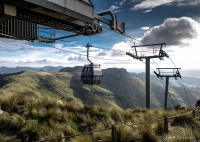
Christchurch Gondola
The spectacular ride takes visitors to the top of the crater rim of Christchurch's extinct volcano on the outskirts of the city, revealing magnificent views over the Canterbury Plains and towards the Southern Alps, and the sweep of Pegasus Bay and Lyttelton Harbour, as it rises to 1,460 feet (445m) above sea level. At the summit the Gondola Complex features the Discovery Ride with a walk-through exhibition and video relaying the history and geological evolution of the Canterbury region as well as Maori mythology. From the summit it's possible to walk back down through the Port Hills to Sumner Beach.
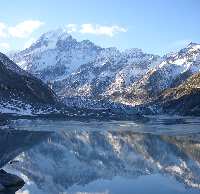
Mount Cook National Park
Mount Cook National Park is known for its exquisite alpine beauty and is home to the highest mountain in New Zealand, Mount Cook. Its Maori name, 'Aoraki' means 'cloud piercer' and at 12,218 feet (3,724m) it towers above the surrounding snow-covered peaks in the park. A third of the park is covered in permanent ice and snow and the mighty Tasman Glacier is the longest glacier outside of the polar regions. Glacial melt gives the lakes their beautiful milky, turquoise colour and there are many walks in the area to take in the dramatic beauty.
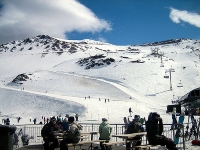
Canterbury
Canterbury is not too far from Christchurch and is one of the most popular ski areas in New Zealand. Mount Hutt is the most developed ski resort in Canterbury and caters for skiers of all levels, with good intermediate and advanced runs, and a 'magic carpet' lift for beginners. There are also some excellent off-piste areas, including a run through the Towers rock formations at the top of the mountain. One of the main disadvantages of Mount Hutt is its location on a very windy section of mountains in New Zealand. The ski area is forced to shut down roughly 14 days per season due to dangerous winds.
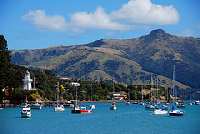
Akaroa
Situated on a peninsula just 45 miles (75km) south of Christchurch, Akaroa is a historic colonial settlement nestled in the heart of an ancient volcano. It is Canterbury's oldest village and its French character is evident in the street names, quaint historical architecture, and French inspired cuisine. The pretty town and its lovely bays and harbour offer an enormous range of activities for tourists. With its beautiful colonial architecture, cafes, and restaurants, Akaroa is an easy place to spend a relaxing day and, for the more active, the surrounding area offers fantastic walking trails, sea kayaking and sailing.
Getting Around
Christchurch has an efficient public transport system and is an easy city to navigate. The bus service is reliable and extensive, with the most popular being the Orbiter, which circles the outer city in both directions seven days a week.
Two of the best transport options for sightseeing are the city's tram, which runs from Cathedral Square, and the City Circuit Bus, which connects major attractions in the city. Taxis are readily available, Uber operates in the city, and there are also several car rental agencies.
Christchurch is fairly flat, so bicycles are another popular mode of transport and many streets have dedicated bike lanes. While public transport is a great way to get around, visitors may find some buses too infrequent for convenient travel and prefer to hire a car.
Christchurch Climate and Weather
Christchurch has a fairly dry, temperate climate, with warm to hot summers and mild winters. Summer temperatures range from mild to hot, and are often moderated by sea breezes blowing in from the northeast. Northwesterly winds, however, are not so kind; hot air blows in with increasing strength and has been known to reach storm force, wreaking havoc on occasion. Winters bring cold days, with temperatures often dropping below freezing level at night, with frost. Snow is a rarity in the city, but falls occasionally in the suburban hills. In summer, between December and February, temperatures average between 51°F (11°C) and 72°F (22°C); and in winter, between June and August, temperatures average between 35°F (2°C) and 54°F (12°C). Rainfall can be expected any time of year, but is more likely in winter.
New Zealand travel info
Electricity
The electrical current is 230 volts, 50Hz. Oblique flat blade plugs are standard.
Language
The official languages in New Zealand are English, Maori and New Zealand Sign Language.
Money
The local currency is the New Zealand dollar (NZD), which is divided into 100 cents. Most businesses accept MasterCard and Visa and, while Diners Club and American Express are also widely accepted in the main tourist centres, they might have limited acceptance elsewhere. ATMs can be found in all towns and cities.
Tipping
Gratuities are not expected in New Zealand, but it's acceptable for guests to tip at their discretion.
Health
There are no health risks associated with travel to New Zealand. New Zealand's Accident Compensation Commission (ACC) covers emergency treatment for visitors, but health insurance is recommended to cover any additional charges and for those not entitled to free emergency treatment. Those intending to participate in adventure activities, such as bungee jumping, white water rafting should ensure that their travel insurance covers these types of activities.
Safety
New Zealand has a reputation as one of the safest destinations in the world, but sensible precautions against petty theft are still advised. Among them, travellers should avoid leaving possessions in unattended vehicles, even if they're out of sight, and they should use the hotel safe if possible.
Travellers who plan on swimming in coastal waters should be aware that riptides are common and can be dangerous, and that several drownings are reported every year. Sharks, seals and other wildlife present a risk to swimmers in certain areas. Travellers should avoid unsupervised beaches and at all times follow the instructions and warnings of lifeguards.
Adventure tourism, which includes zip-lining, rock climbing or trekking, can be dangerous, especially if activities are not well-organised. Enthusiasts should educate themselves on best practices for safety, and arrange activities through a tour operator that meets international standards.
Local customs
Though New Zealand has a strong reputation for tolerance towards homosexuality, there are still isolated incidents of homophobic related crime. LGBT travellers should be aware of local sensitivities, especially when visiting rural areas. Importing illegal drugs is punishable by up to 12 years' imprisonment.
Doing business
New Zealand is ranked first in the World Bank's Ease of Doing Business rankings. The business culture of New Zealand conforms to a typically British model: formal, reserved and conservative. However, this is tempered with a characteristically Antipodean warmth and friendliness, creating a relaxed, yet professional atmosphere.
Business etiquette in New Zealand will be familiar to those who've worked in western corporate environments before. Foreigners should use titles until instructed not to do so, and maintain eye contact when speaking to their associates. Business meetings should be scheduled at least a week in advance, and then confirmed a few days before they are due to take place. The dress code for business in New Zealand is usually formal. For meetings, men should stick to a dark suit, worn with a tie; women should wear a smart dress, business suit or pants suit, and limited accessories.
The official language of business in New Zealand is English, and business hours are generally from 8.30am (or 9am) to 5pm, Monday to Friday; and 9am to 12.30pm on Saturdays.
Duty free
Travellers to New Zealand over 18 years do not have to pay duty on 50 cigarettes, or 50g of cigars or tobacco, or a mixture of all three not exceeding 50g; three bottles of spirits or liqueur each containing not more than 1,125ml; 4.5 litres of wine or beer; and other goods to the value of NZD 700. Goods exceeding the allowances must be declared. Personal effects not dutiable include items such as jewellery, binoculars, portable radios, prams, camping equipment, cameras and video cameras. Prohibited items include concealed firearms, foodstuffs, animals, plants and plant products. It is forbidden to export Greenstone, Maori antiquities and Paua shells (unless they are products manufactured from such shells). Prescription medications need to be accompanied by a doctor's letter and the original prescription, they should not amount to more than three months worth of the medication.
Communications
The international access code for New Zealand is +64. The outgoing code is 00 followed by the relevant country code (e.g. 0061 for Australia). A good option is to purchase a local prepaid SIM card at the airport on arrival. Alternatively travellers use eSIMs if their cellular providers support it on their networks. WiFi access is widely available in hotels, restaurants and other tourist establishments, except in some of the more remote areas.
Passport & Visa
All foreign passengers to New Zealand must hold return or onward tickets, the necessary travel documentation for their next destination, and proof of sufficient funds to cover their expenses while in the country (usually NZD 1,000 per month, or NZD 400 if accommodation has been prepaid). All visitors must obtain a permit to enter Tokelau from the Tokelau Apia Liaison Office in Apia, at least two weeks prior to travel. It's highly recommended that travellers' passports have at least six months' validity remaining after the intended date of departure from their travel destination. Immigration officials often apply different rules to those stated by travel agents and official sources.
Entry requirements
US citizens must have a passport that is valid for at least three months beyond the date of departure from New Zealand. No visa is required for stays of up to three months. Travellers must have a New Zealand Electronic Travel Authority (NZeTA) obtained prior to boarding.
UK citizens must have a passport that is valid for at least three months beyond their date of departure from New Zealand. No visa is required for stays of up to six months. Travellers must have a New Zealand Electronic Travel Authority (NZeTA) obtained prior to boarding.
Canadian citizens must have a passport that is valid for at least three months beyond the date of departure from New Zealand. No visa is required for stays of up to three months. Canadians must have a New Zealand Electronic Travel Authority (NZeTA) obtained prior to boarding.
Australian citizens must have a passport that is valid upon their arrival in New Zealand. No visa is required. An NZeTA is not required.
South African citizens must have a passport that is valid for at least three months beyond the period of intended stay in New Zealand. South Africans require a visitor visa that must be organised prior to travel.
Irish citizens must have a passport that is valid for at least three months beyond the period of intended stay in New Zealand. No visa is required for stays of up to three months. They must have a New Zealand Electronic Travel Authority (NZeTA) obtained prior to boarding.
Useful contacts
Tourism New Zealand, Wellington:+64 4 462 8000 or www.tourismnewzealand.com
111 (All Emergencies)


